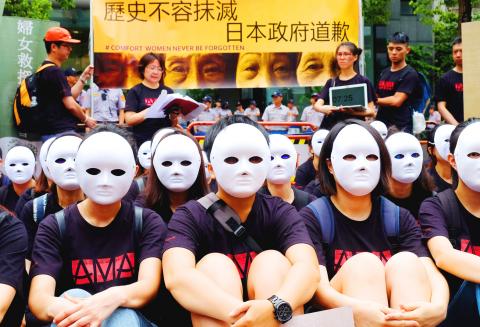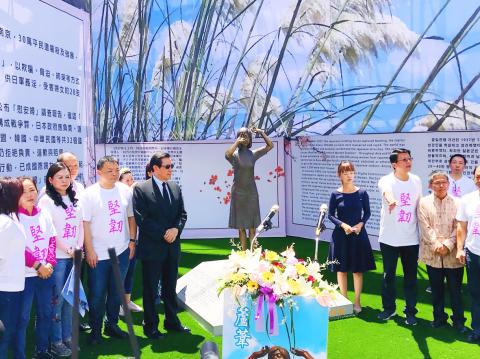About 100 protesters from a coalition of non-governmental organizations yesterday protested outside the Japan-Taiwan Exchange Association in Taipei, demanding that the Japanese government apologize again to surviving Taiwanese “comfort women” and provide them with compensation.
About 2,000 Taiwanese women were estimated to have been forced into sexual slavery by the Imperial Japanese Army during World War II, and the Taipei Women’s Rescue Foundation located 59 survivors after it set up a hotline in 1992, foundation chief executive Fan Ching (范情) said.
“Only two of them remain today and neither were able to attend this demonstration because of their advanced age,” she said.

Photo: Sam Yeh, AFP
Instead, 59 people clad in black and wearing white masks sat silently next to a paper wall printed with the names of the comfort women they represented.
As in its previous protests, the foundation demanded that Japan’s prime minister apologize to the former comfort women on behalf of the Japanese government and provide them compensation.
It also urged the Japanese government to release all documents related to comfort women, initiate an investigation into their history and educate the public about sexual slavery.

Photo: CNA
“To better protect women’s rights and prevent similar things from happening again, the history must be included in Japanese textbooks,” Fan said, adding that until a Japanese prime minister apologizes, the foundation would its annual protests.
The Japanese government should build a museum commemorating the history of comfort women in Japan to educate the public about it, foundation chairwoman Huang Shu-ling (黃淑玲) said.
The foundation has repeatedly invited Japanese Prime Minister Shinzo Abe to visit the AMA Museum in Taipei’s Datong District (大同), which it founded in 2016 to document the history of the comfort women, she said.
No Japanese official has ever visited it, but many Japanese tourists and journalists have, she said.
“Do not underestimate the power of this movement for comfort women. It is the power of women in Asia and around the world who are standing in solidarity to demand human rights,” Huang said.
Over the past several decades, campaigns calling for justice for comfort women have evolved from a local movement to a global one, with the ultimate goal being to end sexual violence, she said.
“Although survivors age and pass away, the movement will not die, because their influence will continue to grow as more young people join in, bringing with them new momentum,” she said.
In Tainan, the Chinese Nationalist Party’s (KMT) Tainan chapter and the Tainan Association for Comfort Women’s Rights yesterday unveiled the nation’s first bronze statue of a comfort woman
At the ceremony, former president Ma Ying-jeou (馬英九) urged the Japanese government to formerly apologize to Taiwanese comfort women and provide compensation.
Aug. 14 has become a day to remember comfort women in Taiwan and South Korea because on Aug. 14, 1991, South Korean Kim Hak-sun became the first former comfort woman to give public testimony about her experience.
Additional reporting by Wang Chun-chung

US President Donald Trump said "it’s up to" Chinese President Xi Jinping (習近平) what China does on Taiwan, but that he would be "very unhappy" with a change in the "status quo," the New York Times said in an interview published yesterday. Xi "considers it to be a part of China, and that’s up to him what he’s going to be doing," Trump told the newspaper on Wednesday. "But I’ve expressed to him that I would be very unhappy if he did that, and I don’t think he’ll do that," he added. "I hope he doesn’t do that." Trump made the comments in

NOT AN OPENING: Trump’s violation of international law does not affect China’s consideration in attacking Taiwan; Beijing lacks capability, not precedent, an official said Taiwanese officials see the US’ capture of the president of Venezuela as a powerful deterrent to Beijing’s aggression and a timely reminder of the US’ ability to defeat militaries equipped with Chinese-made weapons. The strikes that toppled Venezuelan President Nicolas Maduro signaled to authoritarian leaders, including Chinese President Xi Jinping (習近平), US President Donald Trump’s willingness to use military might for international affairs core to US interests, one senior official in Taipei’s security circle said. That reassured Taiwan, the person said. Taipei has also dismissed the idea that Trump’s apparent violation of international law could embolden Beijing, said the official, who was not

A cold surge advisory was today issued for 18 cities and counties across Taiwan, with temperatures of below 10°C forecast during the day and into tonight, the Central Weather Administration (CWA) said. New Taipei City, Taipei, Taoyuan and Hsinchu, Miaoli and Yilan counties are expected to experience sustained temperatures of 10°C or lower, the CWA said. Temperatures are likely to temporarily drop below 10°C in most other areas, except Taitung, Pingtung, Penghu and Lienchiang (Matsu) counties, CWA data showed. The cold weather is being caused by a strong continental cold air mass, combined with radiative cooling, a process in which heat escapes from

Snow this morning fell on Alishan for the first time in seven years, as a strong continental cold air mass sent temperatures plunging across Taiwan, the Central Weather Administration (CWA) said. The Alishan weather station, located at an elevation of about 2,200m in central Taiwan, recorded snowfall from 8:55am to 9:15am, when the temperature dropped to about 1°C, the CWA said. With increased moisture and low temperatures in the high-altitude Alishan area, the conditions were favorable for snow, CWA forecaster Tsai Yi-chi (蔡伊其) said. The last time snow fell at the Alishan weather station was on Jan. 10, 2018, while graupel fell there